2023年外研版中考英语复习 第三节 其他短语综合辨析课件(25张PPT)
文档属性
| 名称 | 2023年外研版中考英语复习 第三节 其他短语综合辨析课件(25张PPT) |  | |
| 格式 | pptx | ||
| 文件大小 | 448.0KB | ||
| 资源类型 | 教案 | ||
| 版本资源 | 外研版 | ||
| 科目 | 英语 | ||
| 更新时间 | 2023-06-04 10:13:56 | ||
图片预览

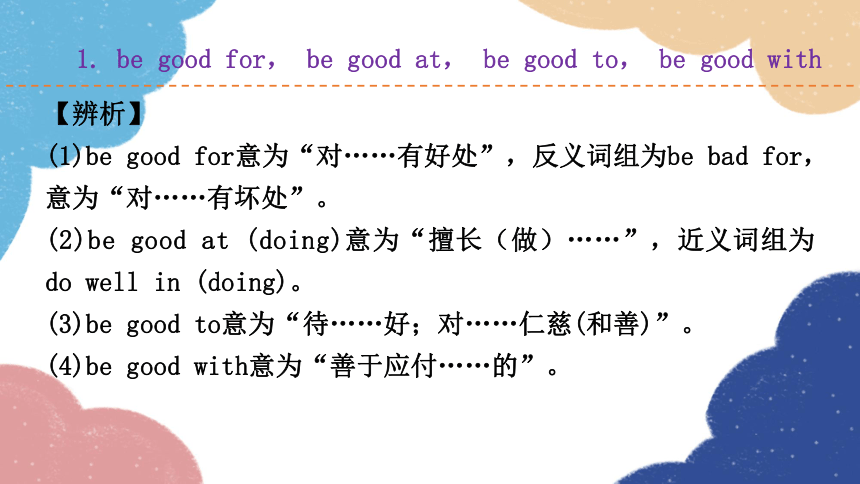
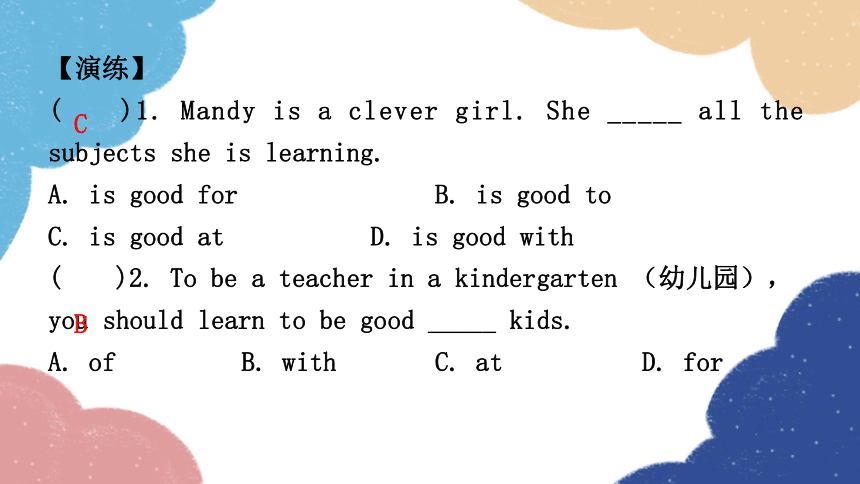
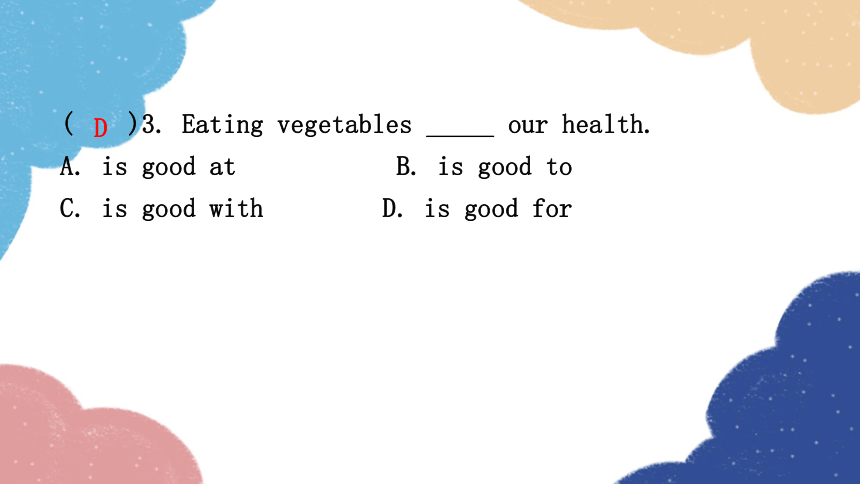
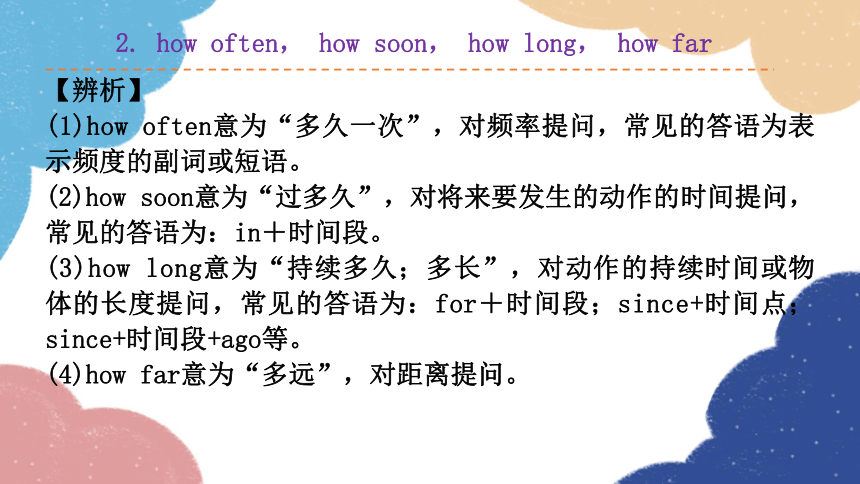
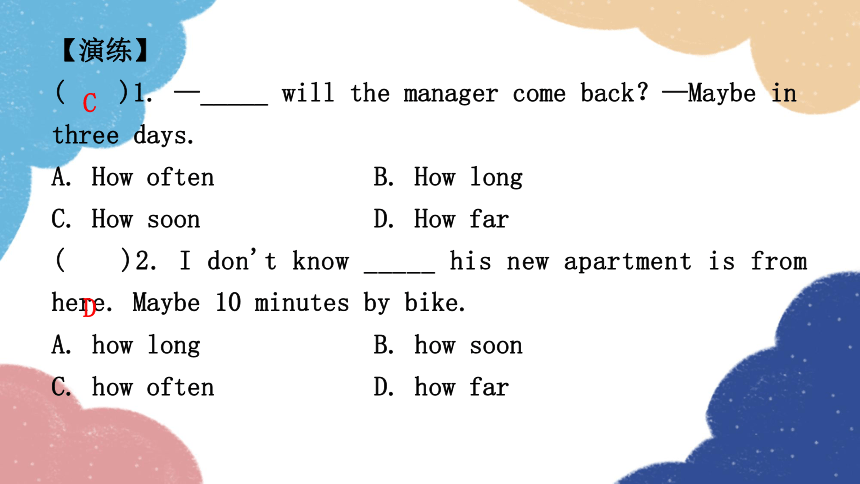
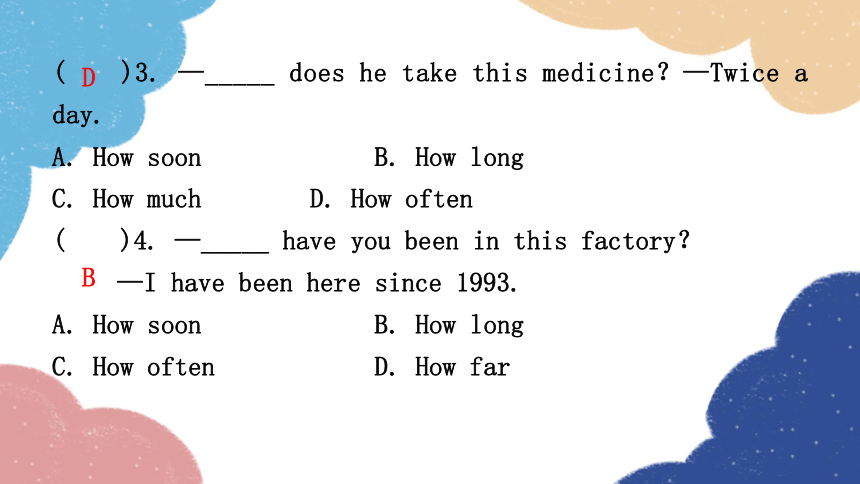
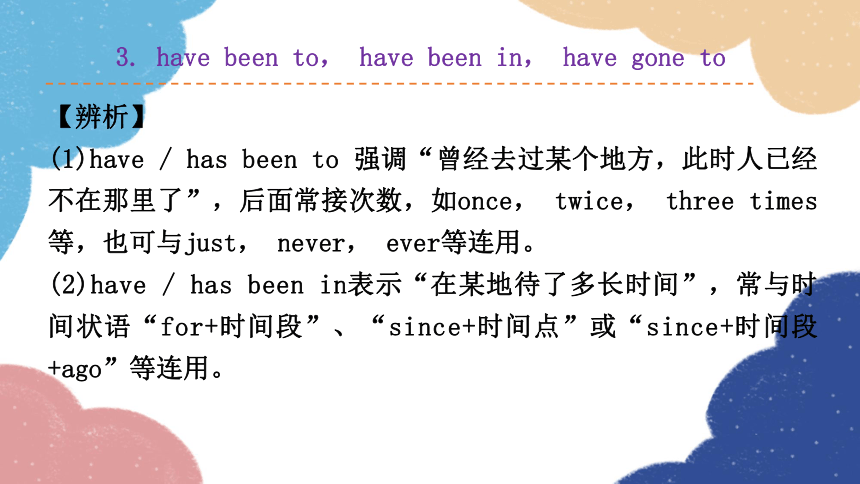

文档简介
(共25张PPT)
中考高频词汇突破
第三节 其他短语综合辨析
【辨析】
(1)be good for意为“对……有好处”,反义词组为be bad for,意为“对……有坏处”。
(2)be good at (doing)意为“擅长(做)……”,近义词组为do well in (doing)。
(3)be good to意为“待……好;对……仁慈(和善)”。
(4)be good with意为“善于应付……的”。
1. be good for, be good at, be good to, be good with
【演练】
( )1. Mandy is a clever girl. She _____ all the subjects she is learning.
A. is good for B. is good to
C. is good at D. is good with
( )2. To be a teacher in a kindergarten (幼儿园), you should learn to be good _____ kids.
A. of B. with C. at D. for
C
B
( )3. Eating vegetables _____ our health.
A. is good at B. is good to
C. is good with D. is good for
D
【辨析】
(1)how often意为“多久一次”,对频率提问,常见的答语为表示频度的副词或短语。
(2)how soon意为“过多久”,对将来要发生的动作的时间提问,常见的答语为:in+时间段。
(3)how long意为“持续多久;多长”,对动作的持续时间或物体的长度提问,常见的答语为:for+时间段;since+时间点;since+时间段+ago等。
(4)how far意为“多远”,对距离提问。
2. how often, how soon, how long, how far
【演练】
( )1. —_____ will the manager come back?—Maybe in three days.
A. How often B. How long
C. How soon D. How far
( )2. I don't know _____ his new apartment is from here. Maybe 10 minutes by bike.
A. how long B. how soon
C. how often D. how far
C
D
( )3. —_____ does he take this medicine?—Twice a day.
A. How soon B. How long
C. How much D. How often
( )4. —_____ have you been in this factory?
—I have been here since 1993.
A. How soon B. How long
C. How often D. How far
D
B
【辨析】
(1)have / has been to 强调“曾经去过某个地方,此时人已经不在那里了”,后面常接次数,如once, twice, three times等,也可与just, never, ever等连用。
(2)have / has been in表示“在某地待了多长时间”,常与时间状语“for+时间段”、“since+时间点”或“since+时间段+ago”等连用。
3. have been to, have been in, have gone to
(3)have / has gone to强调 “去了某个地方,现在人去了还没回”,上下文中往往出现“Where is ...?/ Have you seen ... recently?”等之类的暗示语。
注意 当它们后面接表示地点的副词(如here, there, home等)时,要省略介词in和to。
【演练】
( )1. —Where is Lucy Have you seen her
—She _____ the chemistry lab. She will come back in a few minutes.
A. has been to B. has got to
C. has been in D. has gone to
( )2. —How many times have you _____ Paris?
—Only once.
A. been in B. gone to C. arrived in D. been to
D
D
( )3. —How long have you _____ Guangzhou?
—For about twenty years.
A. gone to B. been in
C. been to D. come to
B
【辨析】
(1)used to do意为“过去常常做”。
(2)be used to do / be used for doing是被动语态,意为“被用来做”。
(3)be / get used to doing 意为“习惯于做”。
be used by意为“被……使用”,介词by后面接动作的执行者;be used as意为“被用作……”,介词as表示“作为”,其后通常接名词。
4. used to do, be used to do / be used for doing,
be / get used to doing
【演练】
( )1. He moved to Australia one month ago. He _____ the life there now.
A. used to B. gets used to
C. is used for D. is used as
( )2. Jack _____ work in the hospital, but now he changes to be a policeman.
A. used to B. gets used to
C. is used for D. is used to
B
A
( )3. The sharp knife _____ cutting the fruit.
A. is used by B. is used to
C. is used for D. is used as
C
【辨析】
(1)at the end of ... 意为“在……的结尾;在……的末端”。
(2)by the end of ... 意为“到……(时间)末为止”。
(3)in the end意为“最后;终于”,可单独使用,近义词(组)为finally, at last。
5. at the end of ..., by the end of ..., in the end
【演练】
( )1. I'm sure everything will be worked out by itself _____ the end.
A. at B. by C. in D. on
( )2. We will have an oral English contest _____ next month.
A. in the end B. at the end
C. at the end of D. in the end of
C
C
( )3. _____ 2025, there will be more robots in people's houses.
A. By the end of B. In the end
C. At the end of D. To the end
A
【辨析】
famous意为“著名的;闻名的”,相当于known / well-known。
(1)be famous as 意为“作为……而著名”,主语与后面的名词(短语)是同类的。
(2)be famous for意为“因……而著名”,主语与后面的名词(短语)是不同类的。
(3)be famous to意为“对……是熟悉的;为……所熟知的”,其后一般接人作宾语。
6. be famous as, be famous for, be famous to
【演练】
( )1. Guilin is famous _____ its beautiful rivers and mountains.
A. as B. for C. to D. in
( )2. Yao Ming is famous _____ a basketball player all over the world.
A. for B. to C. as D. at
( )3. Chairman Mao is famous _____ every Chinese.
A. for B. to C. as D. at
B
C
B
【辨析】
(1)too many意为“太多”,后接可数名词复数形式。
(2)too much意为“太多”,既可以作定语,修饰不可数名词,还可以作状语,用来修饰动词。
(3)much too意为“太”,后接形容词或副词。
7. too many, too much, much too
【演练】
( )1. —Mom, the soup is _____ salty.
—Sorry, dear. I've put _____ salt in it.
A. much too; too much B. too much; too many
C. much too; too many D. too many; too much
A
( )2. There are _____ cars in the street. It's _____ crowded.
A. too much; much too
B. much too; too much
C. too many; much too
D. much too;too many
C
【辨析】
(1)thanks for意为“因……而感谢”,用来表达对他人的感谢之情,其中thanks相当于thank you,for强调原因,其后可接名词或动名词。
(2)thanks to意为“多亏;归功于”,表示感谢对方,由于其所做的事,出现了好的结果。thanks to相当于because of ... 或 with the help of ...,其中to是介词,后接名词或代词。
8. thanks for, thanks to
【演练】
( )1. _____ the Internet, we can know the news from all over the world.
A. Thank you B. Thanks for
C. Thanks to D. Thanks
( )2. Alice, thanks _____ giving me so much help when I was in trouble yesterday.
A. to B. for C. of D. by
C
B
THANKS!
中考高频词汇突破
第三节 其他短语综合辨析
【辨析】
(1)be good for意为“对……有好处”,反义词组为be bad for,意为“对……有坏处”。
(2)be good at (doing)意为“擅长(做)……”,近义词组为do well in (doing)。
(3)be good to意为“待……好;对……仁慈(和善)”。
(4)be good with意为“善于应付……的”。
1. be good for, be good at, be good to, be good with
【演练】
( )1. Mandy is a clever girl. She _____ all the subjects she is learning.
A. is good for B. is good to
C. is good at D. is good with
( )2. To be a teacher in a kindergarten (幼儿园), you should learn to be good _____ kids.
A. of B. with C. at D. for
C
B
( )3. Eating vegetables _____ our health.
A. is good at B. is good to
C. is good with D. is good for
D
【辨析】
(1)how often意为“多久一次”,对频率提问,常见的答语为表示频度的副词或短语。
(2)how soon意为“过多久”,对将来要发生的动作的时间提问,常见的答语为:in+时间段。
(3)how long意为“持续多久;多长”,对动作的持续时间或物体的长度提问,常见的答语为:for+时间段;since+时间点;since+时间段+ago等。
(4)how far意为“多远”,对距离提问。
2. how often, how soon, how long, how far
【演练】
( )1. —_____ will the manager come back?—Maybe in three days.
A. How often B. How long
C. How soon D. How far
( )2. I don't know _____ his new apartment is from here. Maybe 10 minutes by bike.
A. how long B. how soon
C. how often D. how far
C
D
( )3. —_____ does he take this medicine?—Twice a day.
A. How soon B. How long
C. How much D. How often
( )4. —_____ have you been in this factory?
—I have been here since 1993.
A. How soon B. How long
C. How often D. How far
D
B
【辨析】
(1)have / has been to 强调“曾经去过某个地方,此时人已经不在那里了”,后面常接次数,如once, twice, three times等,也可与just, never, ever等连用。
(2)have / has been in表示“在某地待了多长时间”,常与时间状语“for+时间段”、“since+时间点”或“since+时间段+ago”等连用。
3. have been to, have been in, have gone to
(3)have / has gone to强调 “去了某个地方,现在人去了还没回”,上下文中往往出现“Where is ...?/ Have you seen ... recently?”等之类的暗示语。
注意 当它们后面接表示地点的副词(如here, there, home等)时,要省略介词in和to。
【演练】
( )1. —Where is Lucy Have you seen her
—She _____ the chemistry lab. She will come back in a few minutes.
A. has been to B. has got to
C. has been in D. has gone to
( )2. —How many times have you _____ Paris?
—Only once.
A. been in B. gone to C. arrived in D. been to
D
D
( )3. —How long have you _____ Guangzhou?
—For about twenty years.
A. gone to B. been in
C. been to D. come to
B
【辨析】
(1)used to do意为“过去常常做”。
(2)be used to do / be used for doing是被动语态,意为“被用来做”。
(3)be / get used to doing 意为“习惯于做”。
be used by意为“被……使用”,介词by后面接动作的执行者;be used as意为“被用作……”,介词as表示“作为”,其后通常接名词。
4. used to do, be used to do / be used for doing,
be / get used to doing
【演练】
( )1. He moved to Australia one month ago. He _____ the life there now.
A. used to B. gets used to
C. is used for D. is used as
( )2. Jack _____ work in the hospital, but now he changes to be a policeman.
A. used to B. gets used to
C. is used for D. is used to
B
A
( )3. The sharp knife _____ cutting the fruit.
A. is used by B. is used to
C. is used for D. is used as
C
【辨析】
(1)at the end of ... 意为“在……的结尾;在……的末端”。
(2)by the end of ... 意为“到……(时间)末为止”。
(3)in the end意为“最后;终于”,可单独使用,近义词(组)为finally, at last。
5. at the end of ..., by the end of ..., in the end
【演练】
( )1. I'm sure everything will be worked out by itself _____ the end.
A. at B. by C. in D. on
( )2. We will have an oral English contest _____ next month.
A. in the end B. at the end
C. at the end of D. in the end of
C
C
( )3. _____ 2025, there will be more robots in people's houses.
A. By the end of B. In the end
C. At the end of D. To the end
A
【辨析】
famous意为“著名的;闻名的”,相当于known / well-known。
(1)be famous as 意为“作为……而著名”,主语与后面的名词(短语)是同类的。
(2)be famous for意为“因……而著名”,主语与后面的名词(短语)是不同类的。
(3)be famous to意为“对……是熟悉的;为……所熟知的”,其后一般接人作宾语。
6. be famous as, be famous for, be famous to
【演练】
( )1. Guilin is famous _____ its beautiful rivers and mountains.
A. as B. for C. to D. in
( )2. Yao Ming is famous _____ a basketball player all over the world.
A. for B. to C. as D. at
( )3. Chairman Mao is famous _____ every Chinese.
A. for B. to C. as D. at
B
C
B
【辨析】
(1)too many意为“太多”,后接可数名词复数形式。
(2)too much意为“太多”,既可以作定语,修饰不可数名词,还可以作状语,用来修饰动词。
(3)much too意为“太”,后接形容词或副词。
7. too many, too much, much too
【演练】
( )1. —Mom, the soup is _____ salty.
—Sorry, dear. I've put _____ salt in it.
A. much too; too much B. too much; too many
C. much too; too many D. too many; too much
A
( )2. There are _____ cars in the street. It's _____ crowded.
A. too much; much too
B. much too; too much
C. too many; much too
D. much too;too many
C
【辨析】
(1)thanks for意为“因……而感谢”,用来表达对他人的感谢之情,其中thanks相当于thank you,for强调原因,其后可接名词或动名词。
(2)thanks to意为“多亏;归功于”,表示感谢对方,由于其所做的事,出现了好的结果。thanks to相当于because of ... 或 with the help of ...,其中to是介词,后接名词或代词。
8. thanks for, thanks to
【演练】
( )1. _____ the Internet, we can know the news from all over the world.
A. Thank you B. Thanks for
C. Thanks to D. Thanks
( )2. Alice, thanks _____ giving me so much help when I was in trouble yesterday.
A. to B. for C. of D. by
C
B
THANKS!
同课章节目录
- 词法
- 名词
- 动词和动词短语
- 动词语态
- 动词时态
- 助动词和情态动词
- 非谓语动词
- 冠词
- 代词
- 数词和量词
- 形容词副词及其比较等级
- 介词和介词短语
- 连词和感叹词
- 构词法
- 相似、相近词比较
- 句法
- 陈述句
- 一般疑问句和否定疑问句
- 特殊疑问句及选择疑问句
- 反意疑问句
- 存在句(There be句型)
- 宾语从句
- 定语从句
- 状语从句
- 主谓一致问题
- 简单句
- 并列句
- 复合句
- 主谓一致
- 主、表语从句
- 名词性从句
- 直接引语和间接引语
- 虚拟语气
- 感叹句
- 强调句
- 倒装句
- 祈使句
- 句子的成分
- 句子的分类
- 题型专区
- 单项选择部分
- 易错题
- 完形填空
- 阅读理解
- 词汇练习
- 听说训练
- 句型转换
- 补全对话
- 短文改错
- 翻译
- 书面表达
- 任务型阅读
- 语法填空
- 其他资料
